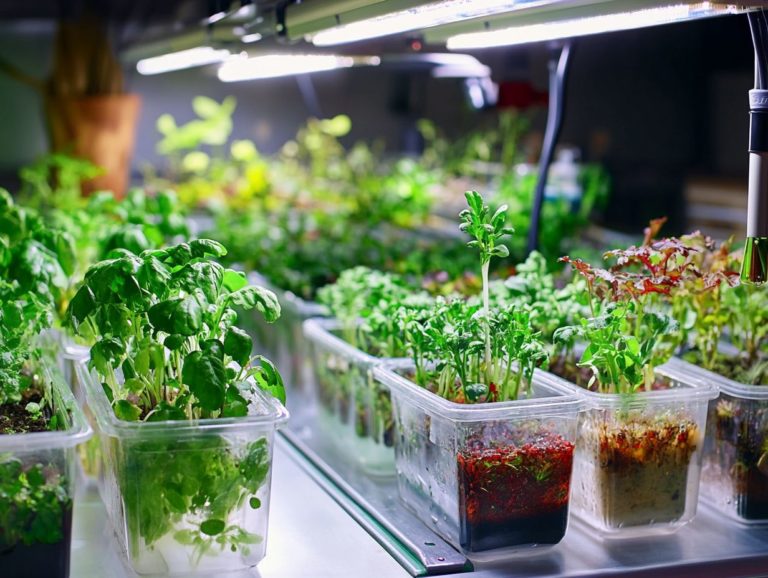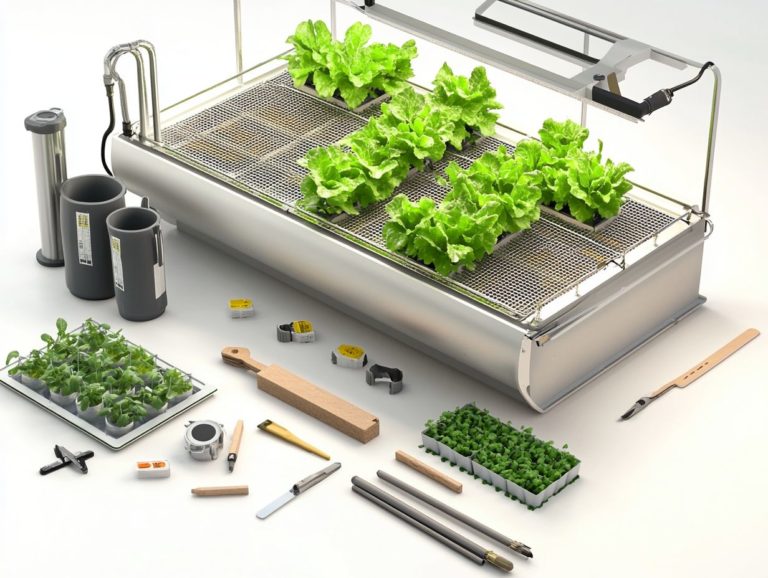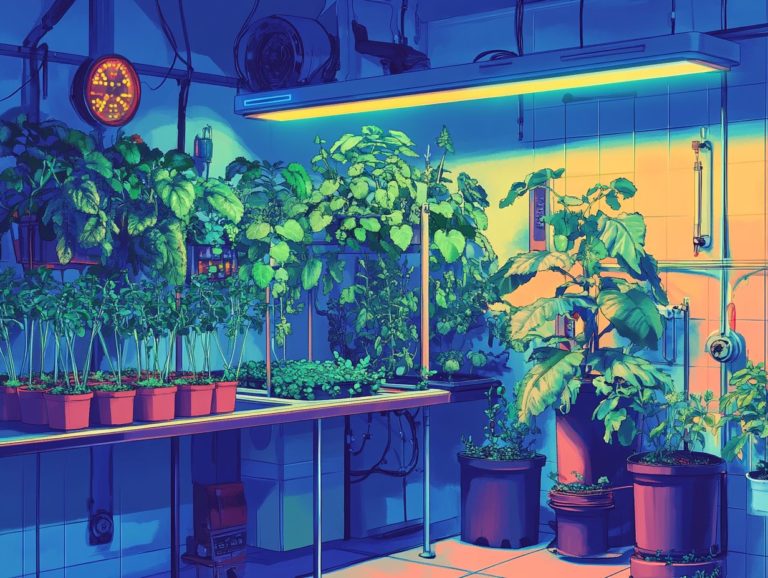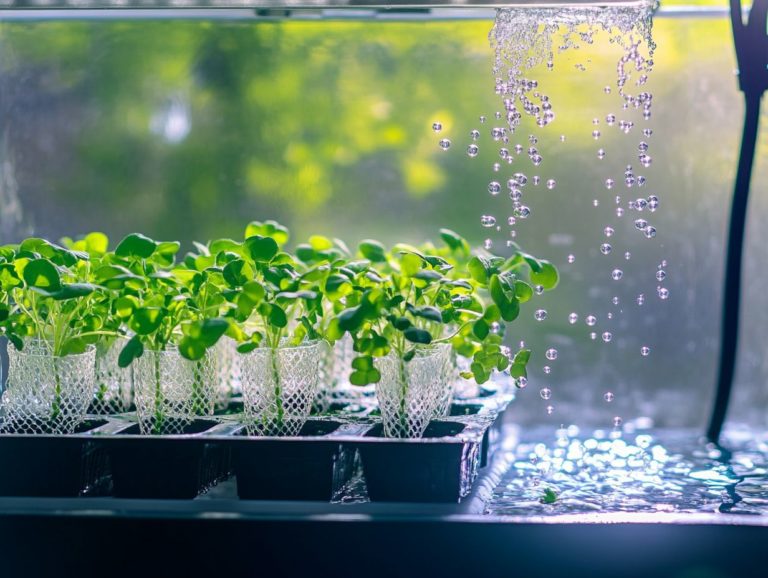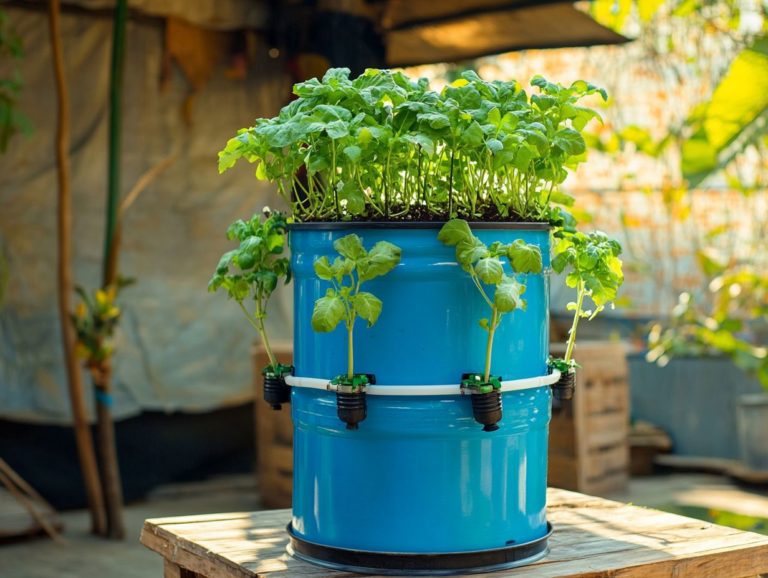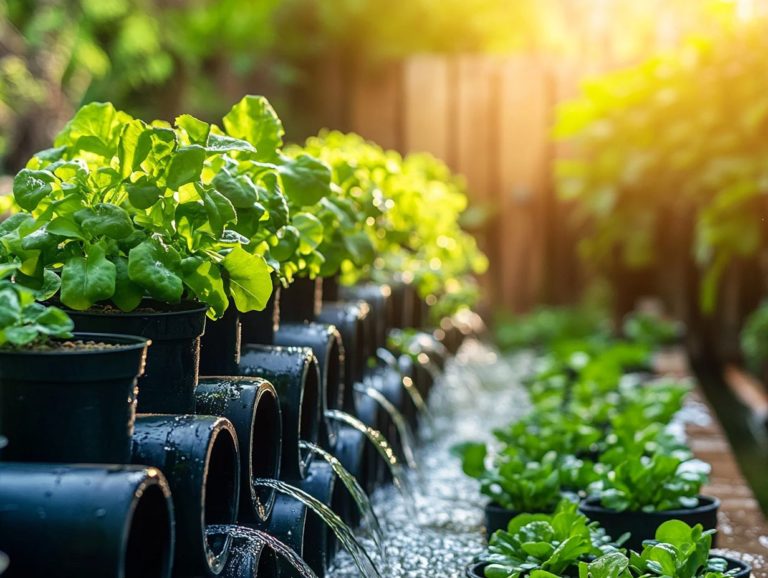Building a Hydroponic Garden in Your Basement
Hydroponic gardening is revolutionizing the way you cultivate plants. You can now grow fresh produce right in the comfort of your own basement!
Get ready to discover the amazing benefits of indoor hydroponic systems. These systems maximize space and guarantee year-round growth. You ll learn how to select the perfect setup and choose the best plants for your environment. Plus, you’ll find tips on maintaining a flourishing garden while troubleshooting common issues that may arise.
Transform your basement into an urban oasis today! Explore the possibilities and uncover the secrets to successful hydroponic gardening!
Contents
- Key Takeaways:
- Benefits of a Basement Hydroponic Garden
- Choosing the Right Setup for Your Basement
- Setting Up Your Basement Hydroponic Garden
- Choosing the Right Plants for Your Basement Garden
- Maintenance and Care for Your Basement Hydroponic Garden
- Troubleshooting Common Issues
- Frequently Asked Questions
- What is a Hydroponic Garden?
- Why Should I Build a Hydroponic Garden in My Basement?
- What Do I Need to Build a Hydroponic Garden in My Basement?
- Do I Need Any Special Skills to Build a Hydroponic Garden in My Basement?
- Can I Grow Any Type of Plant in a Hydroponic Garden in My Basement?
- How Do I Maintain a Hydroponic Garden in My Basement?
Key Takeaways:
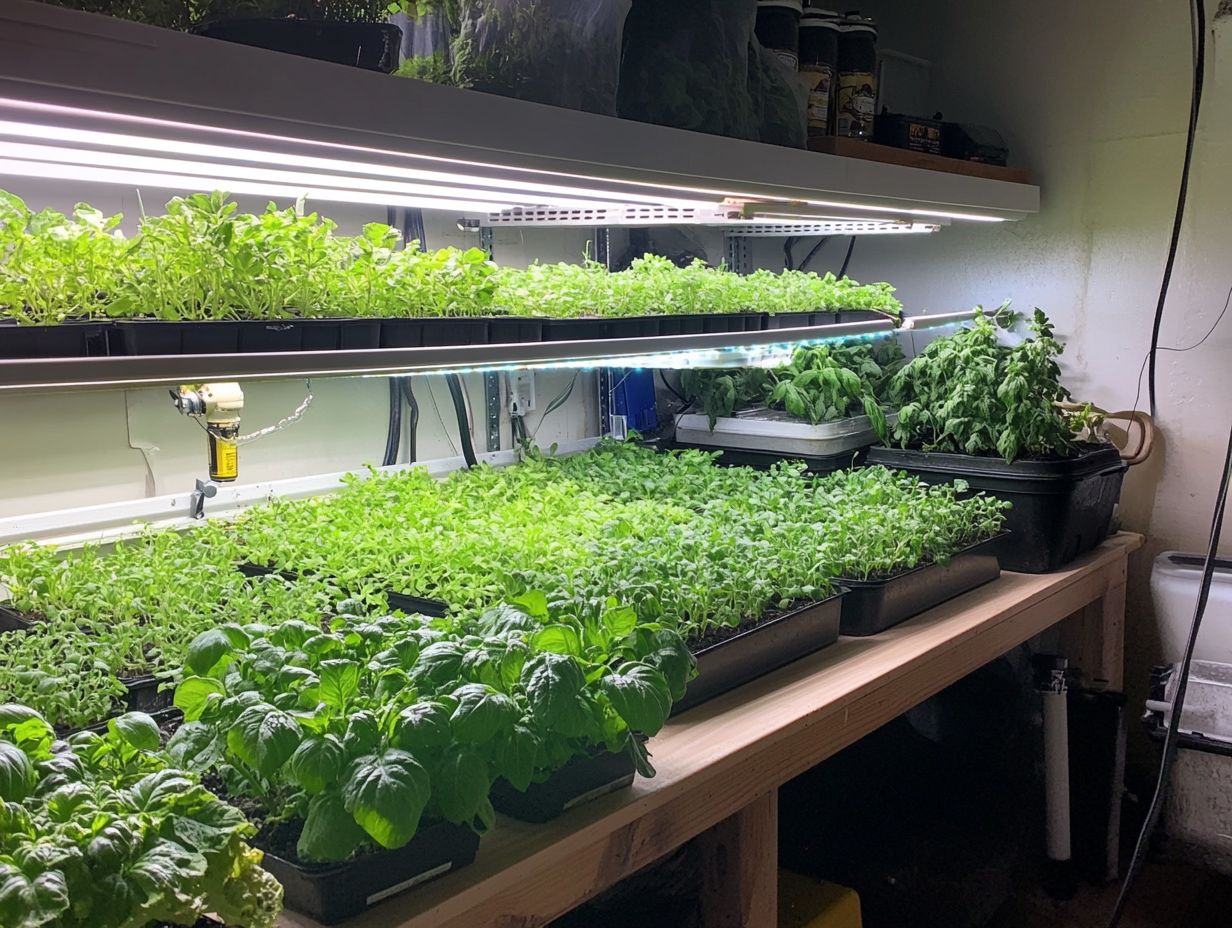
- Unlock the amazing benefits of a hydroponic garden in your basement, including the perk of growing plants indoors.
- Discover the different types of hydroponic systems and how to choose the right setup for your space.
- Follow a simple guide to set up your basement hydroponic garden and keep your plants healthy.
What is Hydroponic Gardening?
Hydroponic gardening is your gateway to cultivating plants without the hassle of soil. It utilizes water mixed with nutrients that plants need to grow, supporting a vibrant array of vegetables, leafy greens, and fruits.
This innovative technique offers a plethora of advantages over traditional gardening. These include optimized use of space, enhanced nutrient delivery, and impressive water conservation. You can dive into advanced hydroponic systems like Deep Water Culture and Ebb and Flow both of which allow plants to grow without soil in unique ways.
By leveraging systems like Fork Farms Flex Farm and Flex Connect, you can automate nutrient delivery and monitor plant growth in real time. This ensures the perfect environment for a variety of plants. Unlike conventional agriculture, which often struggles with pests and disease due to its reliance on soil, hydroponic gardening provides a controlled setting that minimizes these challenges.
With precise nutrient solutions at your fingertips, you ll experience improved growth rates and yield quality an enticing prospect for both hobbyists and commercial growers alike. This method not only maximizes your available space but also significantly reduces the water footprint associated with traditional agricultural practices. It s a smart choice for the environmentally conscious gardener.
Benefits of a Basement Hydroponic Garden
Establishing a basement hydroponic garden opens the door to a multitude of benefits. You’ll enjoy efficient water conservation, consistent watering schedules, and the ability to control climate conditions. All of these factors ensure optimal growth for a variety of vegetables and leafy greens, regardless of outdoor weather conditions.
Use artificial lighting solutions like LED lights, and your indoor hydroponic setup can flourish year-round, thanks to hydroponic systems for home gardeners, delivering fresh produce straight from your home.
Advantages of Growing Plants Indoors
Growing plants indoors with hydroponic systems offers unmatched flexibility. You can choose from a diverse selection of crops like kale, lettuce, tomatoes, and strawberries. This means you can maximize your space, whether you re tending to a small-scale farm or nurturing a home garden.
With the aid of artificial lighting and climate control technologies, you create optimal growth conditions, leading to healthier and more productive plants. By establishing a controlled environment, you can cultivate crops year-round, free from the whims of seasonal changes or adverse weather.
This method presents the advantage of higher yields compared to traditional soil gardening, as nutrients are delivered directly to the roots more efficiently. Tech innovations, such as automated nutrient dosing systems and smart sensors, enable you to monitor and adjust conditions in real time.
Crops like basil and cucumbers thrive in this setting, demonstrating the versatility and immense potential of hydroponics in both home and commercial agriculture.
Choosing the Right Setup for Your Basement
Choosing the ideal setup for your basement hydroponic garden is essential for ensuring your plants thrive. Carefully consider various hydroponic systems, such as Deep Water Culture, Nutrient Film Technique, and Aeroponics.
A well-designed irrigation system works in harmony with careful management of plant food and consistent pH level monitoring. Careful attention to detail helps your plants thrive in the controlled environment of your home.
Types of Hydroponic Systems
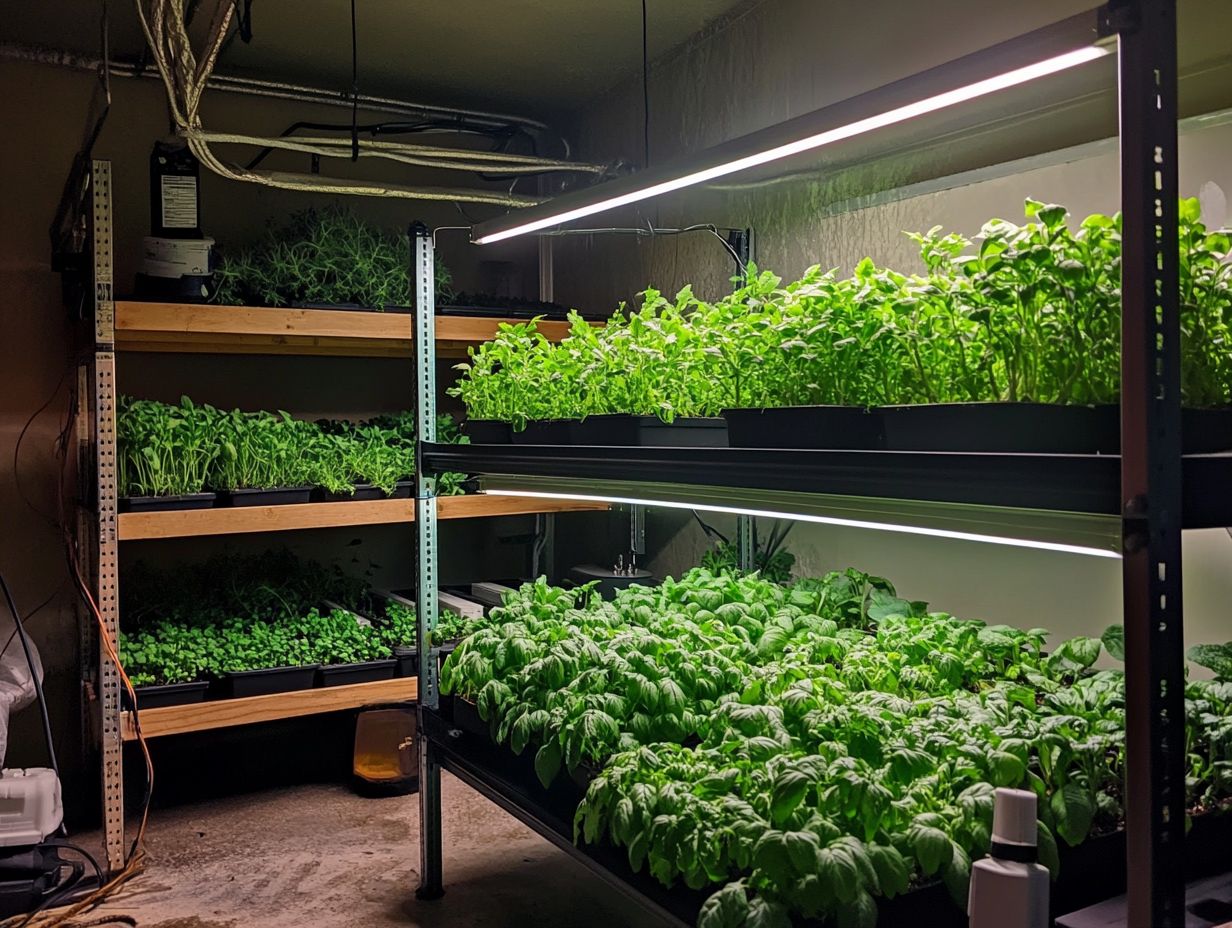
Explore several types of hydroponic systems if you’re keen on growing plants indoors. Each system offers unique benefits and methods of nutrient delivery think Deep Water Culture, Nutrient Film Technique, Ebb and Flow, and Aeroponics. This variety allows you to cultivate impressive leafy greens and vegetables.
These systems create optimal growing conditions and utilize resources efficiently, making them perfect for setups in your basement. For those interested in getting started, check out this guide on how to build a simple hydroponic system.
If you’re just starting out, Deep Water Culture is a fantastic choice. It features a simple reservoir filled with nutrient-rich water where your plant roots can thrive, ensuring constant access to essentials. Alternatively, Nutrient Film Technique circulates a thin film of nutrient solution over the roots, promoting faster growth while using less water talk about efficiency!
Ebb and Flow systems are versatile, allowing for periodic flooding and draining, which enhances oxygenation and reduces the risk of root rot. Aeroponics takes the spotlight by misting the roots with a nutrient solution, making it one of the most efficient systems regarding water usage.
Understand these systems to make an informed choice that aligns with your available space, preferred crops, and maintenance style.
Setting Up Your Basement Hydroponic Garden
Establishing your basement hydroponic garden requires a thoughtful strategy. This involves setting up your garden and integrating advanced artificial lighting and climate control technologies.
By planning each aspect, you create the perfect environment for nurturing plants, allowing you to cultivate a flourishing indoor hydroponic garden that yields fresh leafy greens and vegetables year-round.
Step-by-Step Guide
Creating your basement hydroponic garden can be straightforward with a well-structured, step-by-step guide. Focus on selecting the right hydroponic system, preparing nutrient solutions, and establishing an effective irrigation system tailored to the needs of your leafy greens and vegetables.
Start by evaluating the space available in your basement. Ensure it has access to electricity and adequate lighting conditions these are crucial for your plants success.
Next, gather all necessary supplies, including seeds, growth trays, and your chosen hydroponic system, whether that’s NFT, DWC, or aeroponics. If you’re considering a more efficient setup, look into building a vertical hydroponic garden at home. Once your system is set up, mix your nutrient solutions according to the plants you’re growing, and monitor pH levels regularly for optimal growth.
Remember, consistent maintenance is essential. Regularly check water levels, nutrient concentrations, and environmental factors like temperature and humidity to cultivate a thriving indoor garden.
Choosing the Right Plants for Your Basement Garden
Select the perfect plants for your basement garden by choosing crops that complement hydroponic gardening techniques. Focus on varieties such as leafy greens, tomatoes, cucumbers, and bell peppers these thrive wonderfully in controlled environments.
Choose plants wisely to encourage robust growth and mitigate potential issues like root rot, ensuring your indoor hydroponic system yields a bountiful harvest.
Start your hydroponic journey today! Dive into your basement gardening adventure now!
Best Plants for Hydroponic Gardening
The finest plants for hydroponic gardening encompass a delightful array of leafy greens like kale, lettuce, and spinach. You can also grow popular vegetables such as tomatoes, cucumbers, and even strawberries. These varieties are perfectly suited for indoor cultivation in hydroponic systems.
They thrive brilliantly under artificial lighting and pack a punch in nutritional value. Beyond health benefits, these plants excel in the controlled environment that hydroponics provides. This setup allows quicker growth cycles and higher yields compared to traditional gardening methods.
For example, leafy greens like arugula and Swiss chard occupy minimal space and thrive in a nutrient solution rich in essential elements. Thus, they are ideal for smaller setups.
On the other hand, fruiting plants such as peppers and eggplants can flourish indoors with ample light and proper temperature management. Choosing the right plants for your hydroponic garden enhances your overall gardening success by optimizing space and reducing pest issues.
Maintenance and Care for Your Basement Hydroponic Garden
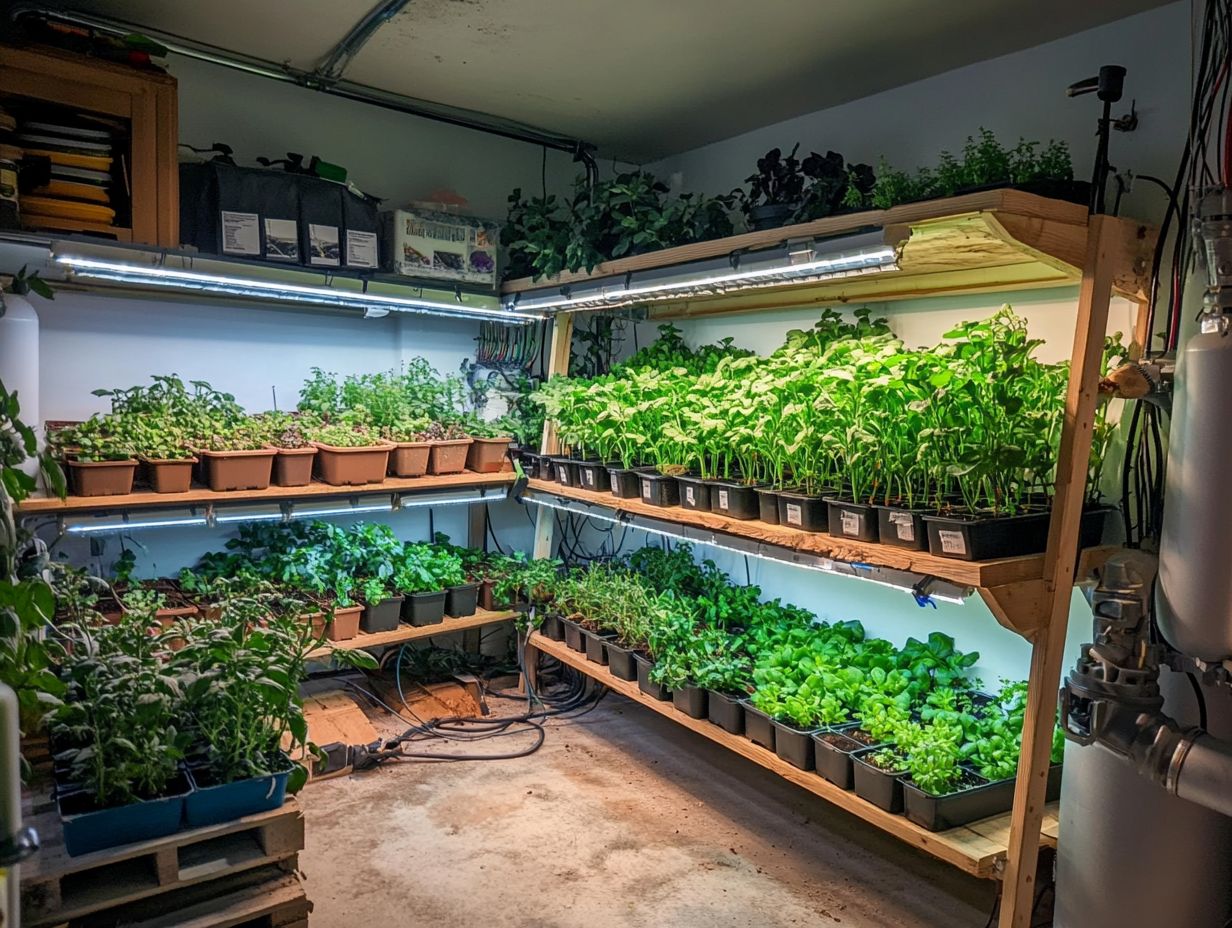
Maintaining your basement hydroponic garden is key for healthy plant growth. Regularly monitor nutrient solutions and pH levels, and ensure consistent watering for optimal conditions.
This ongoing diligence helps avoid issues like root rot. It also significantly boosts overall plant health and productivity.
Tips for Keeping Your Plants Healthy
Keep your hydroponic plants thriving! Here s how to manage nutrients and water effectively. Prioritize effective nutrient solution management, a well-designed irrigation system, and water conservation techniques.
This approach ensures your plants receive essential elements for optimal growth. By regularly monitoring and adjusting, you can avert common problems while cultivating a flourishing indoor environment.
Plants thrive on a balanced diet of macronutrients like nitrogen, phosphorus, and potassium, alongside vital micronutrients such as magnesium and iron. Implementing a scheduled feeding regimen tailored to different growth stages enhances nutrient absorption.
Adopting a drip irrigation system allows for precise water delivery, minimizing waste and preventing overwatering issues. Routinely check pH levels and nutrient strength to keep your solution within optimal ranges, promoting robust plant health throughout their growth cycle. If you’re interested in growing herbs, consider how to start a hydroponic herb garden for a thriving indoor garden.
Troubleshooting Common Issues
Troubleshooting common issues in your hydroponic garden is crucial for maintaining productivity. You may encounter challenges such as root rot, nutrient deficiencies, and imbalanced pH levels.
Recognizing these potential problems and applying proactive solutions can safeguard the health and yield of your basement hydroponic garden. This ensures it thrives throughout its growth cycle.
Identifying and Addressing Problems
Identifying and addressing problems in hydroponic gardening can truly make or break your success. Issues like nutrient deficiencies and root rot can severely impact your plants’ health, so staying vigilant is key.
Regular monitoring and a discerning eye for symptoms will enable you to tackle these challenges head-on. Keep a watchful eye on your plants for signs of distress.
Yellowing leaves, stunted growth, or wilting are often indicators of nutrient imbalances or insufficient light. It s wise to check the pH level of your nutrient solution regularly; fluctuations can disrupt nutrient absorption.
Don t overlook airflow and ventilation, as stagnant conditions can lead to root rot and fungal problems. By promptly addressing these common issues, you can cultivate a flourishing environment that supports healthy plant development and maximizes your yield.
Frequently Asked Questions
What is a Hydroponic Garden?
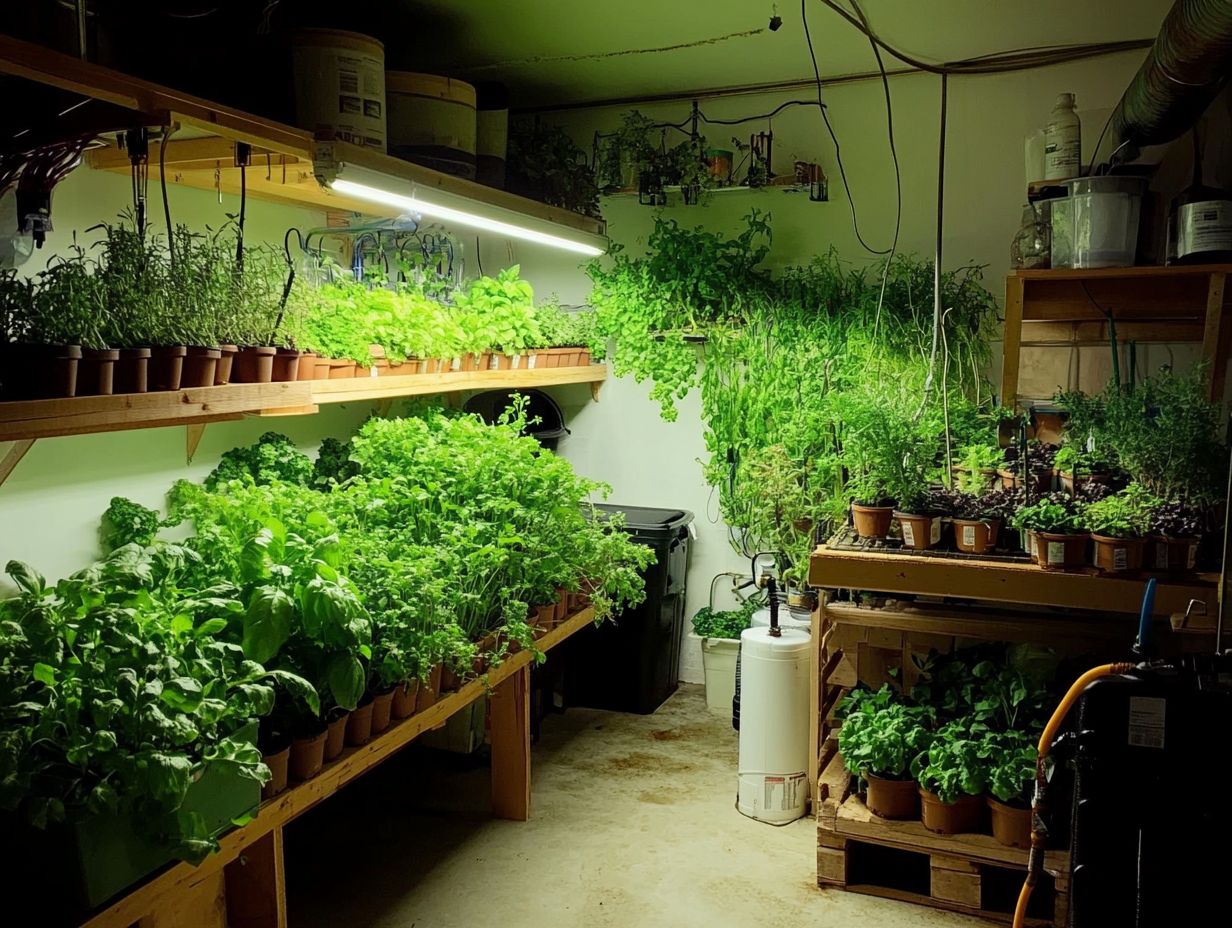
A hydroponic garden is a type of gardening method that does not use soil. Instead, it uses water and nutrient solutions to grow plants.
Why Should I Build a Hydroponic Garden in My Basement?
Building a hydroponic garden in your basement allows you to grow plants in a controlled environment, regardless of the weather outside. It also saves space and eliminates the need for soil, making it a great option for small areas.
What Do I Need to Build a Hydroponic Garden in My Basement?
You will need a hydroponic system, a water source, nutrient solutions, grow lights, and plants. Additionally, you may require extra equipment, such as fans and timers, depending on the size and type of your garden.
Do I Need Any Special Skills to Build a Hydroponic Garden in My Basement?
No, you do not need any special skills. However, some knowledge of basic gardening and a willingness to learn and experiment will help you achieve the best results.
Can I Grow Any Type of Plant in a Hydroponic Garden in My Basement?
Yes, you can grow a wide variety of plants in a hydroponic garden, including vegetables, herbs, and even some fruits. However, it is important to research the specific needs of each plant to ensure proper growth and development.
How Do I Maintain a Hydroponic Garden in My Basement?
Regular maintenance of a hydroponic garden includes checking and adjusting the water and nutrient levels, pruning and harvesting plants, and cleaning the equipment. It is also important to monitor the pH levels and temperature of the water to ensure optimal growth.

